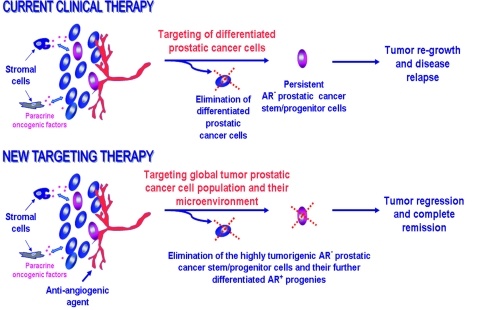Figure 3.
Scheme showing the possible molecular events associated with the resistance of PC cells to current clinical treatments and new targeting therapies against locally advanced and/or metastatic HRPCs. Based on the PC stem/progenitor concept, it is likely that the androgen-independent and highly tumorigenic and migrating PC cells including AR− PC stem/progenitor cells may persist after the current therapeutic treatments including androgen-deprivation therapies. Hence, they can contribute to the tumor regrowth and disease relapse. In contrast, novel combination therapies targeting the total mass of PC cells including AR− PC stem/progenitor cells and their differentiated AR+ progenies as well as their local microenvironment including the host stromal cells such as activated myofibroblasts and endothelial cells could lead to an eradication of the global PC cell population and inhibition of the neoangiogenesis process. These new targeting therapies could induce a total tumor regression and thereby result in a complete remission of patients diagnosed with aggressive and incurable PCs.

